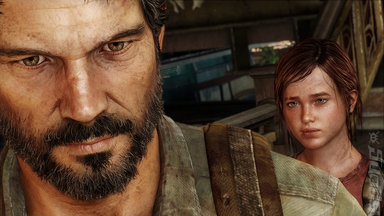Games:
The Last of Us SimCity
As part of an ongoing series, SPOnG gets the unedited, open and highly informed opinions of developers, producers and more in the vast world of computer games.
Industry Figure: Dan Webb
Job Title: Editor-in-Chief
Company: Xbox360Achievements.org, PS3Trophies.org
Breaking into the games media is a difficult game, especially if you have no hook with which to drive traffic. In founding X360A, Editor-in-Chief Dan Webb saw an opportunity that nobody else could - to build a community of those hardcore gamers lusting after those elusive Achievements and Trophies that are now part and parcel of any gaming experience.
With his finger on the 'Cheevo' pulse and a deep knowledge of the Xbox platform, it was as good a time as any to ask Dan what he thinks about always-online, sequelitis and what the PS4 might bring.
Do you feel that an always-online future would be a positive one, for both developers and gamers?
Ha, now that's a contentious subject if ever there was one. On the one hand, you have to look at it from the side of the gamer - someone who's bought the game legitimately - they're effectively having their experience hampered because a publisher is keen to stop someone else pirating it - hardly good customer service, you know, inconveniencing the person who actually bought the game.
I mean, what happens if this person's connection goes down? They effectively can't enjoy the product they've rightly purchased then. What happens if they close down the servers in 5 years? The person who's going to get screwed over is the gamer, every time. I'm not sure that the infrastructure - anywhere in the world for that matter - is stable enough to currently house such a system anyway.
Then there's the side of the publisher and the developer, two entities who deserve to get paid for their hard work and their investment. They should be within their own rights to protect their IP and keep it out the hands of unpaying customers. It's a subject that rests on a knife edge in all honesty.
One thing is for certain though, is that if a publisher decides to use always-online DRM, they simply can't screw it up from their end - hello, SimCity! If you're going to use always-online DRM, at least make sure you're setup to deliver the experience your paying consumers deserve on day one. If there's a 1% chance that you can't do that, find another way to tackle those pesky pirates. Seriously.
Based on Diablo III and SimCity alone, it's not been a great experience for publishers, developers or gamers, and it's been a bit of a kick in the face for the industry's image.
Following Sony's PlayStation 4 reveal event, how successful do you think next-generation consoles will be in capturing the indie and mobile gamer?
That's a tricky one, in all honesty, because they're effectively very different audiences. I, for instance, barely play any mobile or indie games, but when it comes to console games, I play a good 10-20 a year, I reckon. Then on the flip side to me, there's the person that will play mobile games and/or indie games galore, but won't touch a console game with a ten-foot barge pole. Of course, there is some crossover, but that's negligible if you ask me.
If you're asking whether a new £400 (guesstimate, of course) console and its £50 (again, guesstimate) games are going to appeal to a market that likes to play bitesize games when on the go or something truly unique but ultimately rather cheap, honestly, I wouldn't expect to see them flock over anytime soon and see that much of a change. Hey, any mobile game is effectively a gateway into PC or console gaming though, so I'm all for them.
How important is it to create new intellectual properties for existing platforms? Should the final years of a console generation consist of already-established franchises?
I don't think any point of a console generation should just consist of already-established franchises, in all honesty. New IPs are what drives innovation in the industry and they're something that breathes new life into gamers and creates a new kind of enthusiasm - well, the good ones do!
I think it's possibly easier to launch a new IP at the beginning of a console cycle though, mainly because gamers who have just bought their new console are ready to lap up new experiences and are more willing to part with their hard earned cash. More so than at the end of a generation.
That's probably why you're seeing less and less new IPs as this generation comes to a close, but they're still out there, a la The Last of Us and Beyond: Two Souls.
Thanks to Dan for his time. Check out SPOnG's recent industry insights below.
Industry Insights Series:
Mar 2013: Stewart Gilray, Just Add Water / Oddworld Inhabitants
Mar 2013: Alex Neuse, Gaijin Games
Feb 2013: Blazej Krakowiak, Techland
Feb 2013: Gina Jackson, Women in Games Jobs
Feb 2013: Stewart Gilray, Just Add Water & Oddworld Inhabitants
Feb 2013: Dominic Matthews, Ninja Theory
Jan 2013: Dan Webb, X360A
Jan 2013: Antti Ilvessuo, RedLynx
Jan 2013: Andy Payne, O.B.E.
Jan 2013: Gordon Midwood, Different Tuna
Jan 2013: Andrew Smith, Spilt Milk Studios
Jan 2013: Theo Sanders, Ubisoft Singapore
Jan 2013: Paul Rustchynsky, Evolution Studios
Jan 2013: Peter Molydeux, Genius
Jan 2013: Andy Payne O.B.E.
Jan 2013: David Jaffe
Jan 2013: Jon Lander of CCP
Dec 2012: Martyn Brown, InsightforHire
Dec 2012: Steve Lycett, SUMO Digital
Dec 2012: Theo Sanders, Ubisoft Singapore
Dec 2012: Ted Price, CEO Insomniac
Dec 2012: Paul Rustchynsky, Evolution Studios
Dec 2012: Antti Ilvessuo, RedLynx
Industry Figure: Dan Webb
Job Title: Editor-in-Chief
Company: Xbox360Achievements.org, PS3Trophies.org
Breaking into the games media is a difficult game, especially if you have no hook with which to drive traffic. In founding X360A, Editor-in-Chief Dan Webb saw an opportunity that nobody else could - to build a community of those hardcore gamers lusting after those elusive Achievements and Trophies that are now part and parcel of any gaming experience.
With his finger on the 'Cheevo' pulse and a deep knowledge of the Xbox platform, it was as good a time as any to ask Dan what he thinks about always-online, sequelitis and what the PS4 might bring.
Do you feel that an always-online future would be a positive one, for both developers and gamers?
Ha, now that's a contentious subject if ever there was one. On the one hand, you have to look at it from the side of the gamer - someone who's bought the game legitimately - they're effectively having their experience hampered because a publisher is keen to stop someone else pirating it - hardly good customer service, you know, inconveniencing the person who actually bought the game.
I mean, what happens if this person's connection goes down? They effectively can't enjoy the product they've rightly purchased then. What happens if they close down the servers in 5 years? The person who's going to get screwed over is the gamer, every time. I'm not sure that the infrastructure - anywhere in the world for that matter - is stable enough to currently house such a system anyway.
Then there's the side of the publisher and the developer, two entities who deserve to get paid for their hard work and their investment. They should be within their own rights to protect their IP and keep it out the hands of unpaying customers. It's a subject that rests on a knife edge in all honesty.
One thing is for certain though, is that if a publisher decides to use always-online DRM, they simply can't screw it up from their end - hello, SimCity! If you're going to use always-online DRM, at least make sure you're setup to deliver the experience your paying consumers deserve on day one. If there's a 1% chance that you can't do that, find another way to tackle those pesky pirates. Seriously.
Based on Diablo III and SimCity alone, it's not been a great experience for publishers, developers or gamers, and it's been a bit of a kick in the face for the industry's image.
Following Sony's PlayStation 4 reveal event, how successful do you think next-generation consoles will be in capturing the indie and mobile gamer?
That's a tricky one, in all honesty, because they're effectively very different audiences. I, for instance, barely play any mobile or indie games, but when it comes to console games, I play a good 10-20 a year, I reckon. Then on the flip side to me, there's the person that will play mobile games and/or indie games galore, but won't touch a console game with a ten-foot barge pole. Of course, there is some crossover, but that's negligible if you ask me.
If you're asking whether a new £400 (guesstimate, of course) console and its £50 (again, guesstimate) games are going to appeal to a market that likes to play bitesize games when on the go or something truly unique but ultimately rather cheap, honestly, I wouldn't expect to see them flock over anytime soon and see that much of a change. Hey, any mobile game is effectively a gateway into PC or console gaming though, so I'm all for them.
How important is it to create new intellectual properties for existing platforms? Should the final years of a console generation consist of already-established franchises?
I don't think any point of a console generation should just consist of already-established franchises, in all honesty. New IPs are what drives innovation in the industry and they're something that breathes new life into gamers and creates a new kind of enthusiasm - well, the good ones do!
I think it's possibly easier to launch a new IP at the beginning of a console cycle though, mainly because gamers who have just bought their new console are ready to lap up new experiences and are more willing to part with their hard earned cash. More so than at the end of a generation.
That's probably why you're seeing less and less new IPs as this generation comes to a close, but they're still out there, a la The Last of Us and Beyond: Two Souls.
Thanks to Dan for his time. Check out SPOnG's recent industry insights below.
Industry Insights Series:
Mar 2013: Stewart Gilray, Just Add Water / Oddworld Inhabitants
Mar 2013: Alex Neuse, Gaijin Games
Feb 2013: Blazej Krakowiak, Techland
Feb 2013: Gina Jackson, Women in Games Jobs
Feb 2013: Stewart Gilray, Just Add Water & Oddworld Inhabitants
Feb 2013: Dominic Matthews, Ninja Theory
Jan 2013: Dan Webb, X360A
Jan 2013: Antti Ilvessuo, RedLynx
Jan 2013: Andy Payne, O.B.E.
Jan 2013: Gordon Midwood, Different Tuna
Jan 2013: Andrew Smith, Spilt Milk Studios
Jan 2013: Theo Sanders, Ubisoft Singapore
Jan 2013: Paul Rustchynsky, Evolution Studios
Jan 2013: Peter Molydeux, Genius
Jan 2013: Andy Payne O.B.E.
Jan 2013: David Jaffe
Jan 2013: Jon Lander of CCP
Dec 2012: Martyn Brown, InsightforHire
Dec 2012: Steve Lycett, SUMO Digital
Dec 2012: Theo Sanders, Ubisoft Singapore
Dec 2012: Ted Price, CEO Insomniac
Dec 2012: Paul Rustchynsky, Evolution Studios
Dec 2012: Antti Ilvessuo, RedLynx
Games:
The Last of Us SimCity
Read More Like This
Comments
Dan Webb sounds like a really cool down-to-earth dude. Really interesting review.
[3 Apr 2013, 09:17: Message edited by 'config' - spam removed]
[3 Apr 2013, 09:17: Message edited by 'config' - spam removed]



